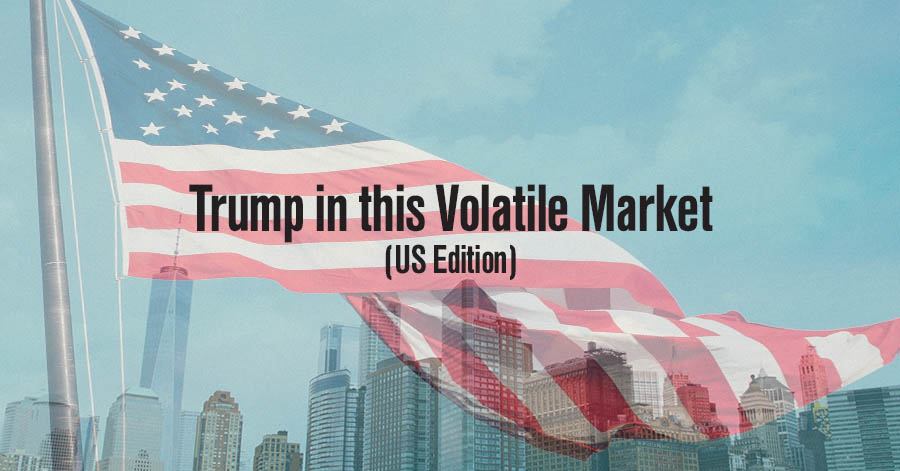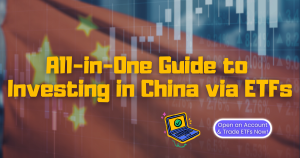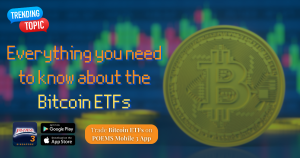Trump in this Volatile Market (US Edition) October 31, 2018

Before investors had enough time to cheer for the all-time high recorded in early October 2018, market turbulence ensued, creating a nightmarish scenario for investors – perhaps the market’s macabre way of marking Halloween! All 3 indices – the S&P 500, Dow & NASDAQ, marched their way into correction territory; plunging by approximately 10% from the highs. With the US Midterm Elections, US Federal Open Market Committee (FOMC) meeting and G20 summit all happening in the month of November 2018, the roller coaster ride markets have been through may not be stopping anytime soon.
US Midterm Elections
The US Midterm Elections on 6th November 2018 will decide who controls the US Congress; potentially impacting current policies in place. In general, the Republicans and Democrats hold opposing views concerning US President Donald Trump’s political plays like tax cuts and the Healthcare Act. If the Republicans remain in control, Trump gets to continue enacting policies that align with his “Make America Great Again” slogan. But what if the Democrats win? What can people expect with two parties with polarising views holding seats in Congress? What we can expect is that the US stock market will continue its bumpy ride till the end of 2018, regardless of who wins.
Interest Rate
Interest rate has been one of the key topics hogging headlines, having been on a steady increase. This has helped create a booming stock market, but has also created an issue for Trump as he has to face the impact of rising interest rates. Trump has blamed the US Federal Reserve for the recent market sell-off and has expressed disappointment with the Fed going against his wishes.[1] Despite Trump’s displeasure, the interest rate is expected to increase by another 0.25% in December 2018, following the FOMC meeting. The Fed deems rate hikes as necessary as core inflation has returned to its target level.
The Importance of Rising Interest Rates
The most direct impact of rising interest rates will be borrowing costs for individuals, corporates or the government. When interest rates rise, your borrowing cost increases, making things like your home loan, personal loan and margin financing more expensive. Corporates and the government will also incur higher interest costs on their funding for projects and expansions. When such a scenario happens, investors may shift their portfolio to debt instruments that offer attractive yields. With a risk-off situation, funds will flow out of equities which will have negative consequences for the stock markets. The rising interest rate will thus create a ripple effect across the entire US economy and elsewhere in the world.
Trump Card or Wild Card?
Trump has been widely criticised on the way he handles foreign relations. The following events bear attention:
- Although the Trump-Kim Summit that took place in Singapore in June 2018 ended peacefully, war threats tweeted by Trump conflict with the push for peace.
- Trump may have shook hands with Chinese President Xi Jinping, but turned a cold shoulder to him by escalating a trade war.
- The US appeared to be on good terms with Saudi Arabia, but events surrounding journalist Jamal Khashoggi’s death has added uncertainty to relations between the two countries.
More uncertainty lies ahead with Trump’s foreign policy at play. The often unpredictable President may make more moves that may cause markets to skip a beat.
Conclusion
Taking into account the risks and uncertainties at play, we can conclude that the market is likely in the correction period or even in a bear market. Once there is any major crisis or event, a free fall in the stock market may be triggered. When that could happen is unpredictable, but it makes sense to prepare and diversify your portfolio to include instruments that will help you ride tumultuous periods – from an investment strategy perspective.
Investors may consider a defensive approach, which involves adding instruments that are less dependent on the state of the stock market into their portfolio. Those looking to adopt such an approach may look at Exchange Traded Funds (ETFs) like Gold ETFs and ETFs that comprise defensive stocks.
Gold has historically been an excellent way to hedge against inflation and uncertainty. Given the Fed’s inflation target and uncertainty in the markets, adding gold into your investment portfolio can be a good diversification strategy. SPDR Gold Trust (GLD.US) offers you a straightforward exposure to Gold as the underlying assets consist of gold bullion stored in secure vaults.
Apart from ETFs that track Gold, investors who prefer to invest in stocks during such volatile times may consider the Invesco Defensive Equity ETF (DEF.US). This ETF employs a unique strategy by seeking stocks that perform during bearish markets via multiple approaches, while also having the potential to grow during uptrends. Investors can use this ETF as a tactical play to scale back beta and volatility in anticipation of a bear market.
Investors who prefer a more aggressive approach may look at volatility ETFs that track the volatility index known as the VIX index. The VIX index tends to spike when uncertainty and fear increase, going against stock market movements. The ProShares VIX Short-Term Futures ETF (VIXY.US) is one of the most popular ETFs that are being traded to hedge against turbulent times.
For those with a higher risk appetite, Leverage and Inverse ETFs can be used to form an outright trade on market movements or as a hedging tool or accelerator.
Investors who intend to ride on the uncertain market with Volatility, Leverage and Inverse ETFs should note that these ETFs are not meant to be held for more than a few days due to higher trading and rollover costs.
More information about the above-mentioned ETFs can be seen in the table below:
| ETF | SPDR Gold Trust | Invesco Defensive Equity ETF | ProShares VIX Short-Term Futures ETF |
| Ticker | GLD | DEF | VIXY |
| Exchange | AMEX | AMEX | AMEX |
| Inception Date | 18 Nov 2004 | 15 Dec 2006 | 03 Jan 2011 |
| AUM (million USD) | 29,711 | 186.7 | 134.3 |
| Expense Ratio | 0.4% | 0.6% | 0.87% |
| Asset Class | Commodity | Equity | Alternative |
Source: Bloomberg data as of 29 Oct 2018
Trade the above ETFs with us on POEMS 2.0 and POEMS Mobile 2.0!
Don’t have an account? Trade these ETFs from as low as USD12*. Open one with us today!
Information is accurate as of 29 October 2018
Reference:
Disclaimer
These commentaries are intended for general circulation. It does not have regard to the specific investment objectives, financial situation and particular needs of any person who may receive this document. Accordingly, no warranty whatsoever is given and no liability whatsoever is accepted for any loss arising whether directly or indirectly as a result of any person acting based on this information. Opinions expressed in these commentaries are subject to change without notice. Investments are subject to investment risks including the possible loss of the principal amount invested. The value of the units and the income from them may fall as well as rise. Past performance figures as well as any projection or forecast used in these commentaries are not necessarily indicative of future or likely performance. Phillip Securities Pte Ltd (PSPL), its directors, connected persons or employees may from time to time have an interest in the financial instruments mentioned in these commentaries. Investors may wish to seek advice from a financial adviser before investing. In the event that investors choose not to seek advice from a financial adviser, they should consider whether the investment is suitable for them.
The information contained in these commentaries has been obtained from public sources which PSPL has no reason to believe are unreliable and any analysis, forecasts, projections, expectations and opinions (collectively the “Research”) contained in these commentaries are based on such information and are expressions of belief only. PSPL has not verified this information and no representation or warranty, express or implied, is made that such information or Research is accurate, complete or verified or should be relied upon as such. Any such information or Research contained in these commentaries are subject to change, and PSPL shall not have any responsibility to maintain the information or Research made available or to supply any corrections, updates or releases in connection therewith. In no event will PSPL be liable for any special, indirect, incidental or consequential damages which may be incurred from the use of the information or Research made available, even if it has been advised of the possibility of such damages. The companies and their employees mentioned in these commentaries cannot be held liable for any errors, inaccuracies and/or omissions howsoever caused. Any opinion or advice herein is made on a general basis and is subject to change without notice. The information provided in these commentaries may contain optimistic statements regarding future events or future financial performance of countries, markets or companies. You must make your own financial assessment of the relevance, accuracy and adequacy of the information provided in these commentaries.
Views and any strategies described in these commentaries may not be suitable for all investors. Opinions expressed herein may differ from the opinions expressed by other units of PSPL or its connected persons and associates. Any reference to or discussion of investment products or commodities in these commentaries is purely for illustrative purposes only and must not be construed as a recommendation, an offer or solicitation for the subscription, purchase or sale of the investment products or commodities mentioned.
About the author

Allen Tan
Dealer
Allen graduated from Nanyang Technological University with a Bachelor’s Degree, majoring in Economics with a minor in Business. He joined Phillip Securities in 2016 as an Equity Dealer in the Global Markets Team. He specialises in the US and Canada market and also supports the UK and Europe market.

 All-in-One Guide to Investing in China via ETFs
All-in-One Guide to Investing in China via ETFs  Everything you need to know on Bitcoin ETFs
Everything you need to know on Bitcoin ETFs  Maximising your Tax Savings & Retirement Funds with SRS in Singapore
Maximising your Tax Savings & Retirement Funds with SRS in Singapore  Is There a “Fairest of Them All”?
Is There a “Fairest of Them All”? 









